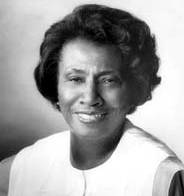
Undine Eliza Anna Smith Moore (25 August 1904 – 6 February 1989) was a notable and prolific African-American composer of the 20th century. She was also a professor emeritus at Virginia State University. Moore wrote more than 100 compositions, although only about 26 of these were published in her lifetime. Much of her work was composed for choir or voice and many of these were inspired by black spirituals and folk music. Moore once said that she was “a teacher who composes, rather than a composer who teaches.
Moore was born in Jarratt, Virginia. She was the granddaughter of slaves. In 1908, her family moved to Petersburg, Virginia. She began studying piano at age seven with Lillian Allen Darden. Moore attended Fisk University, where she studied piano with Alice M. Grass. In 1924, at the age of 20 became the first graduate of Fisk University to receive a scholarship to Juilliard. Graduating cum laude in 1926, she became supervisor of music for the Goldsboro, North Carolina public school system. She commuted to New York’s Columbia University between 1929 and 1931 and received her Master of Arts in Teaching.
In 1938 she married Dr. James Arthur Moore. James Arthur was the chair of the physical education department at Virginia State College. On 4 January 1941 they had a daughter, Mary Hardie.
Undine Smith Moore died in Petersburg, Virginia on February 6, 1989. A composition by Adolphus Hailstork, “I Will Lift Up Mine Eyes,” was created in 1989. A historical marker was approved in 2010 for installation in Petersburg. Moore was named one of the Virginia Women in History for 2017.
She began teaching piano, organ and music theory at Virginia State College (now Virginia State University) in 1927, remaining a member of the faculty until she retired in 1972. While at Virginia State University, she taught Camilla Williams and jazz pianist, Billy Taylor. Moore, along with Altona Trent Johns co-founded the Black Music Center at Virginia State University in 1969. Moore traveled widely as a professor and lectured on black composers and also conducted workshops. She was a meticulous teacher who left behind a large archive of her teaching materials, lesson plans, exercises and more.
Moore was a visiting professor at Carleton College and the College of Saint Benedict, and an adjunct professor at Virginia Union University during the 1970s. Among her many awards were the National Association of Negro Musicians Distinguished Achievement Award in 1975, the Virginia Governor’s Award in the Arts in 1985, and a Candace Award from the National Coalition of 100 Black Women in 1984.
She was awarded honorary Doctor of Music degrees by Virginia State University (1972) and Indiana University (1976) and in 1977 was named music laureate of Virginia.
Known to some as the “Dean of Black Women Composers,” Moore’s career in composition began while she was at Fisk University. While her range of compositions include works for piano and for other instrumental groups, Moore is more widely known for her choral works. Scenes from the Life of a Martyr, a 16-part oratorio on the life of Dr. Martin Luther King, Jr., for chorus, orchestra, solo voices and narrator was premiered at Carnegie Hall and was nominated for a Pulitzer Prize.
Other familiar compositions are “Afro-American Suite for flute, violoncello, and piano”, “Lord, We Give Thanks to Thee” for chorus, “Daniel, Daniel, Servant of the Lord” for chorus, and “Love, Let the Wind Cry How I Adore Thee.”

